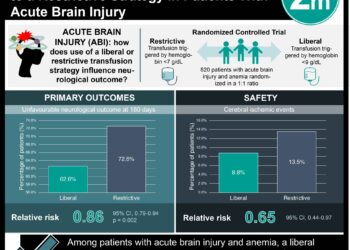Association of early postnatal transfer and birth outside a tertiary hospital with mortality and severe brain injury in extremely preterm infants
1. Extremely preterm infants born in non-tertiary hospitals in England had an increased risk of death, and transfer in the first 48 hours postnatally was associated with increased risk of severe brain injury relative to infants born in tertiary neonatal care.
Evidence Rating Level: 2 (Good)
Extremely preterm infants born at less than 28 weeks of gestation are at an increased risk of death and neonatal morbidity. When women at risk of extremely preterm delivery present to non-tertiary hospitals, one may consider transfer to a tertiary care setting before delivery, immediately after delivery (postnatally) or delayed after delivery following complete stabilization of the infant. The introduction of a networked model of neonatal care in England has allowed for increased early postnatal transfer of these infants to tertiary care settings, which may, in fact, be associated with adverse outcomes. This retrospective cohort study aimed to examine how early postnatal transfer compares to ongoing non-tertiary neonatal care with respect to mortality and severe brain injury as outcomes among extremely preterm infants. This study used data on all extremely preterm infants admitted to neonatal units in England between January 2008 and December 2015, collected via the UK National Neonatal Research Database. Infants were grouped into four categories: the upward transfer group, with those born in hospitals with local neonatal units and transferred within 48 hours; the non-tertiary group, with those born in such hospitals and not transferred within 48 hours; the horizontal transfer group, with those born in a tertiary hospital and transferred to a different tertiary hospital for non-clinical reasons within 48 hours due to non-clinical reasons (e.g. insufficient capacity); and the control group, with infants born in a tertiary hospital and not transferred within 48 hours. Propensity score matching and pre-defined background variables were used to create subgroups with equal distributions of confounding variables. Of 2,181 infants included (727 from each of the upward transfer, non-tertiary and control groups matched), infants in the upward transfer group were found to have similar odds of death before discharge (OR 1.22, 95% CI 0.92 to 1.61) but significantly higher odds of severe brain injury (OR 2.32, 95% CI 1.78 to 3.06, NNT 8) and lower odds of survival without severe brain injury (OR 0.60, 95% CI 0.47 to 0.76, NNT 9) compared to controls. The non-tertiary care group was found to have significantly higher odds of death (OR 1.34, 95% CI 1.02 to 1.77, NNT 20) but similar odds of severe brain injury (OR 0.95, 95% CI 0.70 to 1.30) and survival without severe brain injury (OR 0.82, 95% CI 0.64 to 1.05) compared to controls. There was no significant difference in death before discharge between upward transfer and non-tertiary groups, but a significantly lower risk of severe brain injury (OR 0.41, 95% CI 0.31 to 0.53, NNT 8) and higher odds of survival without severe brain injury (OR 1.37, 95% CI 1.09 to 1.73, NNT 14) were reported. The findings of this study therefore suggests that extremely preterm infants born in non-tertiary hospitals may be at an increased risk of death, and that transfer in the first 48 hours postnatally may be associated with an increased risk of severe brain injury relative to infants born in tertiary neonatal care without transfers.
Click to read the study in BMJ
Image: PD
©2019 2 Minute Medicine, Inc. All rights reserved. No works may be reproduced without expressed written consent from 2 Minute Medicine, Inc. Inquire about licensing here. No article should be construed as medical advice and is not intended as such by the authors or by 2 Minute Medicine, Inc.









